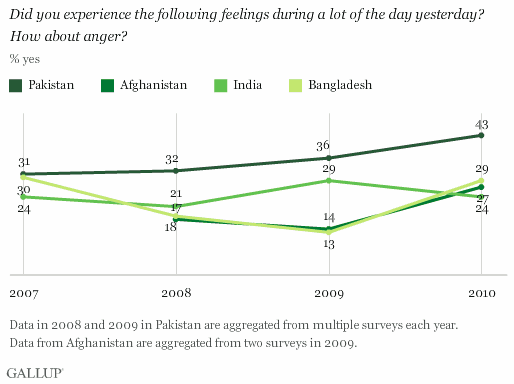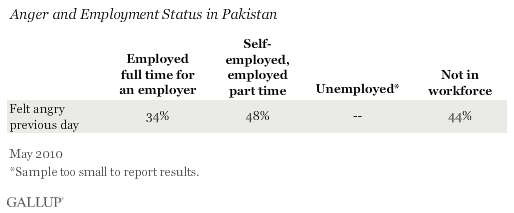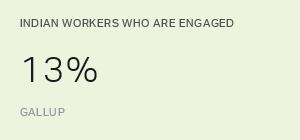WASHINGTON, D.C. -- Amid economic and political instability, Gallup surveys show Pakistanis were angrier last year than they have been in the past several years. Forty-three percent of Pakistanis polled in May 2010 said they felt angry a lot of the previous day, up from 31% in 2007. Pakistanis were more likely to be angry than their neighbors in South Asia.

Gallup's surveys in Pakistan took place before floods devastated large swaths of the country in late summer, placing more stress on Pakistanis, who already had many reasons to be frustrated. The global economic crisis hit many Pakistanis hard. Growth slowed, inflation climbed, and unemployment soared. On top of their economic woes, Pakistanis continued to grapple with political instability and security problems as their country fights militants on its own soil.
Rural Pakistanis, who tend to be poorer and more economically vulnerable than their urban counterparts, were also more likely to be angry. Nearly half of rural Pakistanis (46%) said they were angry a lot of the day before the survey, compared with 37% of urban Pakistanis. This was particularly true in rural areas of Khyber Pakhtunkhwa province (formerly North West Frontier Province) and Sindh, where majorities reported feeling angry the day before.
Pakistanis With Good Jobs in a Better Mood
Gallup's global surveys show that people with "good jobs," those who are employed full time for an employer, tend to have the highest well-being of those in the workforce. In Pakistan, the 22% of the population employed full time for an employer are also less likely to be angry than the 22% who are self-employed or employed part time. About one in three Pakistanis (34%) who are employed full time for an employer said they were angry a lot the day before the survey, compared with nearly half (48%) of those who are otherwise employed.

Implications
The Asia Development Bank's report on Pakistan released this week warned that the country's economy still faces "considerable challenges," including the possibility of higher inflation. Energy shortages and security issues stymied growth in 2010, the report said, keeping it well below the level needed to create jobs. Beyond tangible economic outcomes, Pakistanis' anger provides an important gauge of the population's overall well-being during difficult times.
For complete data sets or custom research from the more than 150 countries Gallup continually surveys, please contact SocialandEconomicAnalysis@gallup.com or call 202.715.3030.
Survey Methods
Results are based on face-to-face interviews with 1,030 adults, aged 15 and older, conducted in May 2010 in Pakistan. For results based on the total sample of national adults, one can say with 95% confidence that the maximum margin of sampling error is ±3.7 percentage points. FATA/FANA were excluded. The excluded area represents less than 5% of the population. Gender-matched sampling was used during the final stage of selection. Note: Sample coverage improved and there was a change in the data collection agency beginning with the June 2009 measurement. The margin of error reflects the influence of data weighting. In addition to sampling error, question wording and practical difficulties in conducting surveys can introduce error or bias into the findings of public opinion polls.
